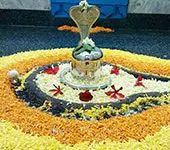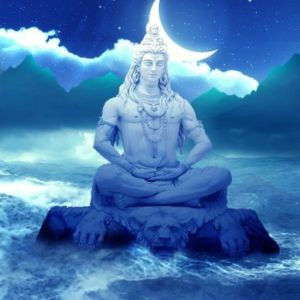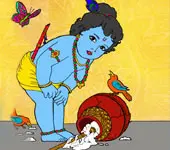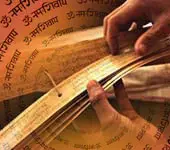Why You Should Not Speak While Performing Yajna
Words or speech in the form of mantras is an integral part of the yajna. The performer of the yajna should be fully focused on what he is doing. If he talks about anything else then images connected to those words will also be present in his mind. They will corrupt the mantras and the effect of the mantras.
Transcript
(Click here to read more)
We are talking about Darshapurnamaseshti. Understanding the concept of yajna is very important. That's what we are doing here. Paddy is to be taken to prepare the offering called purodasha. For this, out of the vessels already placed on top of darbha grass laid to the east of the Garhapatya Agni kunda, two vessels called Shurpa and Agnihotra havani are taken out. Shurpa is the winnow and Havani is the ladle. They are called patras, patra is the general term. Even when we serve food, a vessel containing the food and a spoon are required.....
Transcript
(Click here)
We are talking about Darshapurnamaseshti.
Understanding the concept of yajna is very important.
That's what we are doing here.
Paddy is to be taken to prepare the offering called purodasha.
For this, out of the vessels already placed on top of darbha grass laid to the east of the Garhapatya Agni kunda, two vessels called Shurpa and Agnihotra havani are taken out.
Shurpa is the winnow and Havani is the ladle.
They are called patras, patra is the general term.
Even when we serve food, a vessel containing the food and a spoon are required.
अथ शूर्पं चाग्निहोत्रहवणीं चादत्ते- कर्मणे वां वेषाय वाम्।
Yajna is a karma, physical and mental actions are involved in yajna.
In yoga, both physical and mental actions are to be stopped.
In meditation, there is mental action, but you have to sit without any physical movement, without any physical action.
Here, in yajna both physical and mental actions are there.
कर्मणे वां- picking you up for performing karma.
These two are for collecting paddy.
There is the physical action and also mental alertness such as getting the correct quantity, and making sure that the paddy is clean.
वेषाय वाम्- for serving we are picking you both.
Hereafter, the purohita, the adhwaryu who is performing this should not speak anything other than what is part of the yajna.
He can chant mantras, he can say vakyas if they are part of the procedure, but nothing else.
अथ वाचं यच्छति। वाग् वै यज्ञः। अविक्षुब्धो यज्ञं तनवा इति।
Words or speech in the form of mantras is an integral part of the yajna.
The performer of the yajna should be fully focused on what he is doing.
If he talks about anything else then images connected to those words will also be present in his mind.
They will corrupt the mantras and the effect of the mantras.
Take a good singer, a popular singer.
You are able to enjoy the song because it is recorded in a studio, a sound proof studio.
No other sound goes into the song.
Only his voice and the sound of the instruments are there.
Suppose he is standing in the middle of a market and singing, you are recording it on the mobile phone; will it have the same effect?
Will it be enjoyable as much?
No.
You have to exclude every other sound, then only it will be good.
So here the performer of the yajna also has to keep away, exclude all other words from his mind.
That's why वाचं यच्छति।
If other words get mixed up into the mantra, when he is chanting they may not be there in the mantra but if other words are there in the mind then they can corrupt the mantra.
Everywhere focus is important.
Like a surgery, focus and precision are very important in yajna as well.
Not that the purohita is an expert so he can keep on talking politics with those around him and at the same time do what he is supposed to do.
If you are a good driver, you can keep talking while you are driving.
Driving has become part of you, a reflex.
You don't have to tell yourself- now apply the brake, now speed up.
In the same way, the purohita who is an expert may be able to do everything even without applying his mind.
But he should not do that.
He should be absolutely focused on what he is doing.
The mind with worldly words and thoughts becomes vikshubda.
Vikshubda is one of the chitta vrittis that Patanajala yoga sutra talks about.
A vikshubda mind keeps on switching between focus and unfocus.
This should not happen.
वाग् वै यज्ञः- words are integral and most important in yajna.
Words in the form of mantras decide the outcome, the result of the yajna.
So words should be regulated.
Words lead to thoughts.
Thoughts lead to words.
So unwanted words and thoughts should be excluded.
The Shurpa and Ahavani are shown in Agni and heated saying:
प्रत्युष्टं रक्षः प्रत्युष्टा अरातयो निष्टप्तं रक्षो निष्टप्ता अरातयः
This is the seventh mantra of the first adhyaya of Shukla Yajurveda Samhita.
Rakshasas don't like yajnas being performed.
That's why Ravana's Rakshasa used to kill and eat Munis who performed yajnas.
Vishwamitra had come to take Lord Rama and Lakshmana so that they could protect his yajna from Rakshasas.
Raati means offerings made in Agni as well as dakshina given to purohitas.
Araati means those who don't want this to happen.
The yajamana's enemies.
Rakshasa hide in the vessels using their magical powers.
When the shurpa and havani are heated, the Rakshasas burn and die.
The evil intentions of the enemies to cause hindrance in the yajna are also burned away when the vessels are heated in Agni.
Recommended for you
Why is tamboola offered to God?
 Click here to know more..
Click here to know more..
Om Namah Shivaya - Peaceful Chanting

om namah' shivaaya ......
Click here to know more..Akshaya Gopala Kavacham

shreenaarada uvaacha. indraadyamaravargeshu brahmanyatparamaa'dbhutam. akshayam kavacham naama kathayasva mama prabho.....
Click here to know more..
English Topics
Vedas
Click on any topic to open
- 85 Culture vis-a-vis Agriculture
- 84 Whenever I have Read any Part of the Vedas
- 83 Vedas - Holy Books Of Hinduism
- 82 How The Vedas Manifested Into Material Objects
- 81 What does Rigveda contain?
- 80 Why Vedas are called Shruti?
- 79 What Vedas say about periods
- 78 How Vedas Came Into Existence
- 77 Vedas are eternal, not written by anyone
- 76 Relationship Between The Vedas And The World
Please wait while the audio list loads..
30
Ganapathy
Shiva
Hanuman
Devi
Vishnu Sahasranama
Mahabharatam
Practical Wisdom
Yoga Vasishta
Vedas
Rituals
Rare Topics
Devi Mahatmyam
Glory of Venkatesha
Shani Mahatmya
Story of Sri Yantra
Rudram Explained
Atharva Sheersha
Sri Suktam
Kathopanishad
Ramayana
Mystique
Mantra Shastra
Bharat Matha
Bhagavatam
Astrology
Temples
Spiritual books
Purana Stories
Festivals
Sages and Saints
